“Bacterial hands” kill over 4,600 children every day worldwide Over 2,000 secondary school students in HK joined “Soap for Good” project and help to combat with epidemic diseases
2013-10-14
HONG KONG, 14 October 2013──According to the latest figure released by UNICEF, diarrhoea and pneumonia take away lives of 1.7 million children under the age of five each year, which means every day, these deadly diseases which can be simply prevented by proper handwashing, has killed more than 4,600 children each day. Meanwhile, in Hong Kong, October is a peak season of enterovirus and hand, foot and mouth disease infection. To help combat these diseases, the Hong Kong Committee for UNICEF (UNICEF HK) has echoed the call for Global Handwashing Day, and initiated “Soap for Good” project again for the second year. The project has received great support from many secondary school students in Hong Kong. Among other things, they volunteered with Soap Cycling to process used hotel soap and recycle them into life-saving gifts to be distributed to children in developing countries. These lifesaving bars of soap will help ensure children’s health and protect them from epidemics of infectious diseases.
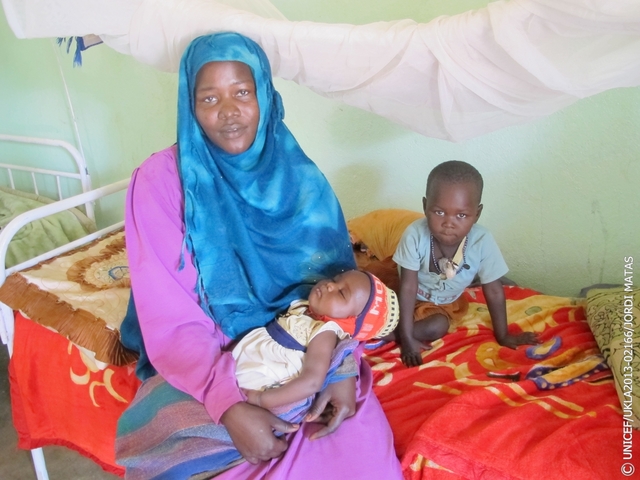 According to the 2013 Progress Report on Committing to Child Survival: A Promise Renewed released by UNICEF, the annual under-five deaths from diarrhoea and pneumonia decreased by 45 percent from 3.1 million in 2000 to 1.7 million in 2012. Although there is progress in saving children’s lives, the number is still appalling because they can be prevented. For the 1,600 children die because of diarrhoea every day, most of them are children younger than two years. More than 3,000 children under five die from pneumonia every day.
According to the 2013 Progress Report on Committing to Child Survival: A Promise Renewed released by UNICEF, the annual under-five deaths from diarrhoea and pneumonia decreased by 45 percent from 3.1 million in 2000 to 1.7 million in 2012. Although there is progress in saving children’s lives, the number is still appalling because they can be prevented. For the 1,600 children die because of diarrhoea every day, most of them are children younger than two years. More than 3,000 children under five die from pneumonia every day.In Hong Kong, hand, foot and mouth disease caused by enterovirus is more common among young children. Serious complications and even death may occur on people suffering this disease.In the first nine months of this year, hundreds of cases have been recorded for its outeak in institutions.
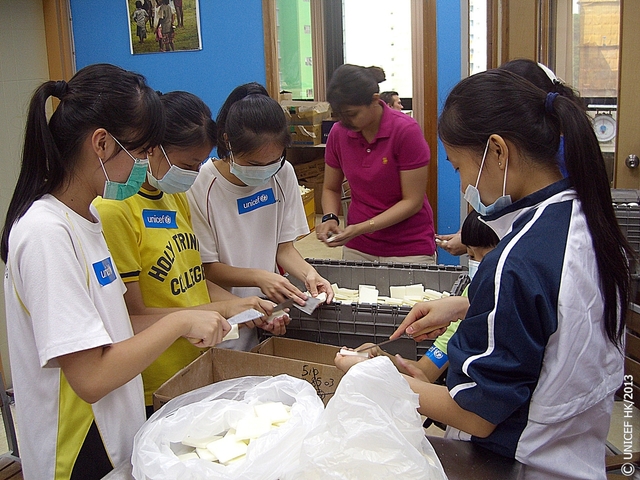 Regardless of diarrhoea, pneumonia, enterovirus or hand, foot and mouth disease, washing hands with soap is the most efficient and cost-effective measure of prevention. Cultivating a habit of washing hands before eating and after using toilet can reduce the incidence rate of diarrhoea by almost half and acute respiratory infections by 25 per cent. However, the rate of handwashing remains relatively low to date. The rate of handwashing at critical moments, such as before handling food and after using toilet, is not higher than 34 per cent. The rate recorded in some regions is even zero. We must not delay to raise the awareness of proper handwashing among the general public.
Regardless of diarrhoea, pneumonia, enterovirus or hand, foot and mouth disease, washing hands with soap is the most efficient and cost-effective measure of prevention. Cultivating a habit of washing hands before eating and after using toilet can reduce the incidence rate of diarrhoea by almost half and acute respiratory infections by 25 per cent. However, the rate of handwashing remains relatively low to date. The rate of handwashing at critical moments, such as before handling food and after using toilet, is not higher than 34 per cent. The rate recorded in some regions is even zero. We must not delay to raise the awareness of proper handwashing among the general public.Therefore, more than 100 countries respond to 15 October Global Handwashing Day every year and put great efforts in promoting the culture of washing hands with clean water and soaps, helping to meet Millennium Development Goal 4 – to cut the rate of under-five mortality by two-thirds by 2015. UNICEF HK also responded to the call and launched a Global Handwashing Day local campaign for the third consecutive year.
This year, UNICEF HK continues to partner with Soap Cycling and initiates Global Handwashing Day “Soap for Good” project 2013.Through mobilising more than 30 UNICEF Club member schools, with over 2,000 secondary school students, UNICEF HK organised a series of activities in schools and communities, including helping to handle the collected soap which will be delivered to Hong Kong and developing countries, helping to promote the message of “Wash with Soap, Live with Hope”.
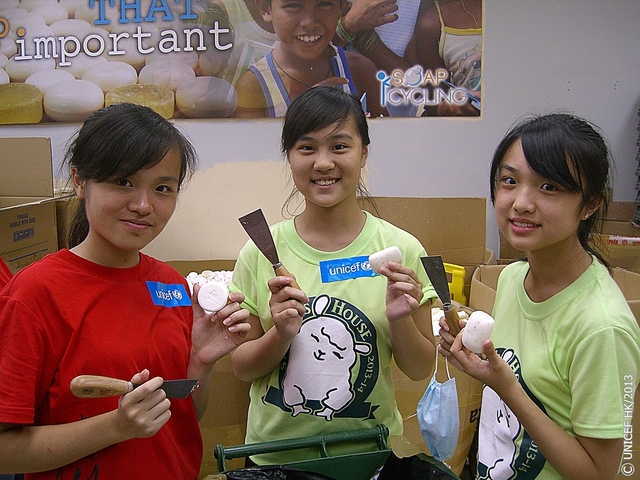 Seventeen students from Holy Trinity College, a UNICEF Club member school, started the first “Soap with Good” recycled soap workshop last month. They went to the Soap Cycling workshop and helped process lightly used soap collected from hotels, scraping and sorting the soap bars and packing them for shipment. The soap will be delivered to the disadvantaged families and groups in Hong Kong and developing countries, such as the Philippines.
Seventeen students from Holy Trinity College, a UNICEF Club member school, started the first “Soap with Good” recycled soap workshop last month. They went to the Soap Cycling workshop and helped process lightly used soap collected from hotels, scraping and sorting the soap bars and packing them for shipment. The soap will be delivered to the disadvantaged families and groups in Hong Kong and developing countries, such as the Philippines.To further enhance the culture of handwashing in campus, the members of UNICEF Club even planned to negotiate with school for placing soaps at every school toilet and posting the seven steps of handwashing information, to effectively prevent all teachers and students infected by epidemic diseases and enhance the sanitation level in campus.
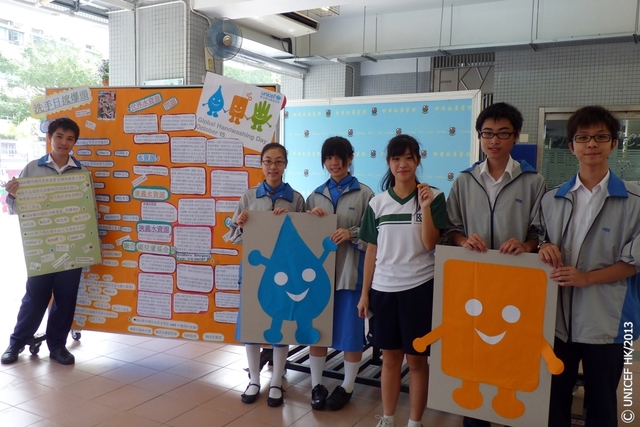 Ms Irene Chan, Chief Executive of UNICEF HK, said, "UNICEF HK continues to launch the Soap for Good project,recycling the quality soaps that should have been at landfills, and recreating them into new ones through the strength of the whole community.It helps those in need locally and children and families in developing countries, improving their knowledge of health. Besides,it helps the general public to understand the importance of handwashing with soap, helping more children to celeate their fifth birthday."
Ms Irene Chan, Chief Executive of UNICEF HK, said, "UNICEF HK continues to launch the Soap for Good project,recycling the quality soaps that should have been at landfills, and recreating them into new ones through the strength of the whole community.It helps those in need locally and children and families in developing countries, improving their knowledge of health. Besides,it helps the general public to understand the importance of handwashing with soap, helping more children to celeate their fifth birthday."All Hong Kong citizens can also join with the global supporters to promote Global Handwashing Day and the importance of handwashing, such as changing their Facebook profile pictures. For details, please visit UNICEF HK Global Handwashing Day webpage: /globalhandwashingday
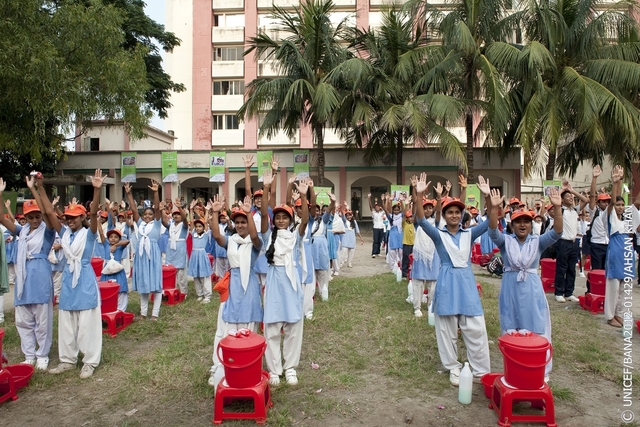 Since the first "Global Handwashing Day" campaign organised in 2008, nearly 200 million people in more than 100 countries participate in Global Handwashing Day every year. The campaign has been recognised by various countries, international institutions, civil social groups, non-profit making organisations, private corporate and the general public, aiming to promote and support handwashing with soap to be the global culture.It makes every city or region with good handwashing culture to be the focus of their countries, and promote the benefits of handwashing with soap to the public.
Since the first "Global Handwashing Day" campaign organised in 2008, nearly 200 million people in more than 100 countries participate in Global Handwashing Day every year. The campaign has been recognised by various countries, international institutions, civil social groups, non-profit making organisations, private corporate and the general public, aiming to promote and support handwashing with soap to be the global culture.It makes every city or region with good handwashing culture to be the focus of their countries, and promote the benefits of handwashing with soap to the public.- END -









